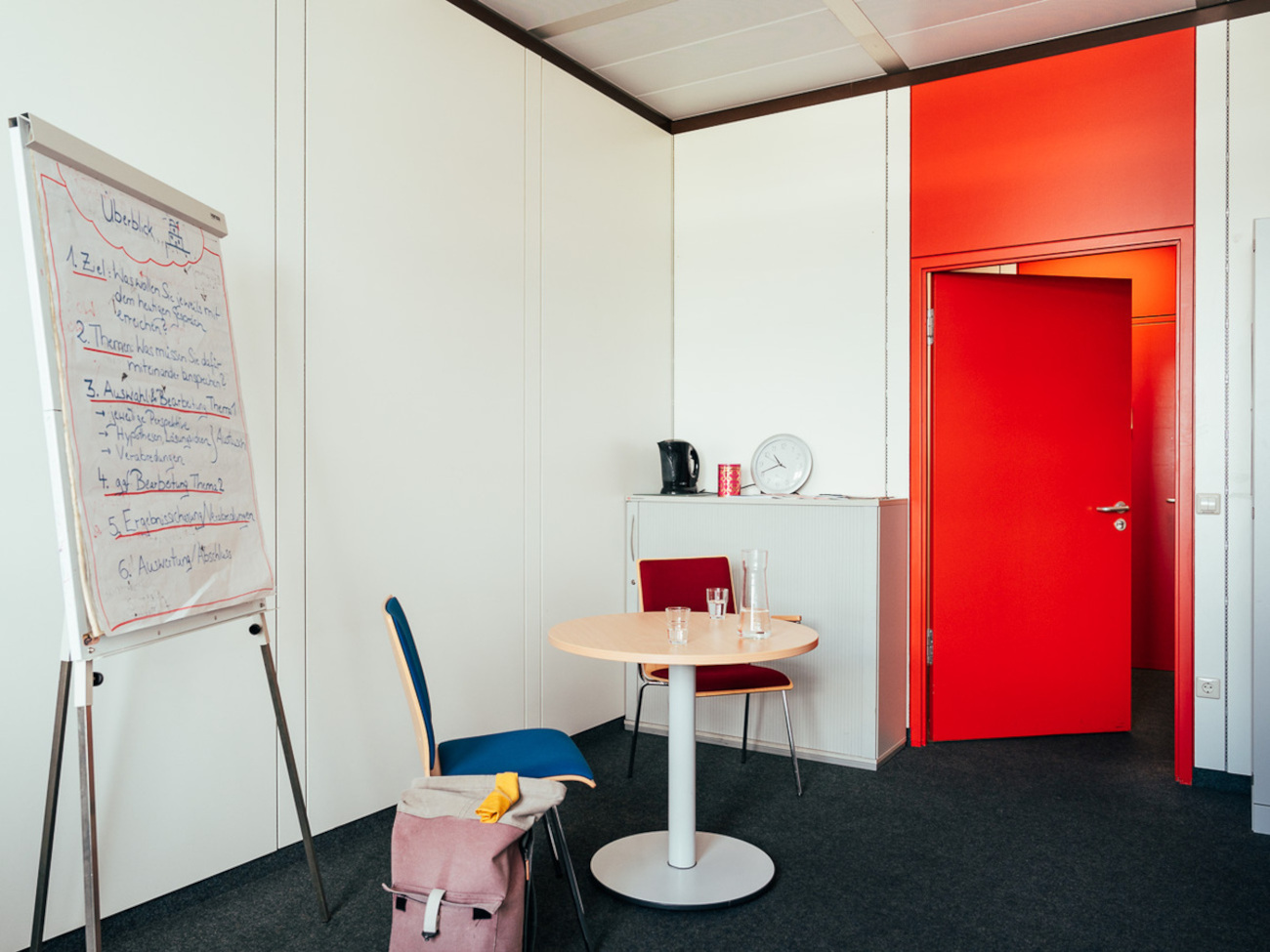
© Lukas Klose / Universität Bremen
What to Do in Cases of Discrimination, Conflict, and Violence? How the ADE Supports University Members
Each year, the ADE provides counseling to approximately 140 individuals from the university who are seeking advice. The facility also offer a comprehensive training program.
No one really likes to hear it, but the fact is that we all discriminate. We’re usually not even aware of it. Additionally, we are all involved in conflicts. How can we deal well with these facts of study and professional life? The University’s Anti-Discrimination and Conflict Management Office (ADE) provides counseling on this. The offer is geared towards all university members, whether students, employees in technology and administration, or professors. Members of other universities in Bremen and employees of the core administration of Bremen’s public service sector can also contact the ADE.
Jana was looking forward to her new position at the University of Bremen. Finally working in a team again – what a great thought after several years as a solo self-employed person. But after just a few days, Jana realized that teamwork can also be exhausting. Why are the work meetings so tedious? Hardly anyone says anything and when someone does speak up, the discussion always gets hung up on some triviality. What’s the point? With one colleague, it’s really bad. She is a bit older and has been working at the university for many years but instead of introducing Jana to the joint project, she seems to be avoiding her. What does the colleague have against her?
Admittedly, Jana’s story is made up but it’s not far from reality. Almut Dietrich, Sewita Mebrahtu, and their colleagues at ADE often hear scenarios like this in their counseling sessions. “Such behaviors are early markers for us,” explains Mebrahtu (a legal scholar). Her colleague Dietrich (supervisor and organizational consultant) adds, “Avoiding others, isolating yourself in your office – these can be signs of conflict or discrimination in the team.” Like all of their colleagues at ADE, both have completed various additional training courses as counselors and have many years of practical experience in the subject area.
Listening Actively
And how would the counselors address Jana’s concerns if she came to them? “Taking it seriously and actively listening in the sense of really wanting to understand,” says Mebrahtu. During the first conversation, she always tries to find out what the issue is and what exactly the person seeking advice wants.
Depending on what concerns Jana approaches ADE with, the counselors’ task varies. Does Jana feel discriminated against by her older colleague because she is young? Or is it more about the simmering conflicts in the team meetings? At ADE, distinctions between conflict and discrimination are clear, and so are different ways of acting on the respective areas of focus of their work.
“However, discrimination often develops into conflict or vice versa,” explains Almut Dietrich. In contrast to discrimination, which often bubbles under the surface and is difficult to grasp, conflicts are easier to name. The two counselors attribute this to the defensiveness with which most people react to the term discrimination. “However, avoiding the term discrimination makes it difficult to talk about it,” says Sewita Mebrahtu. In general, however, the sensitivity and awareness of discrimination has been increasing for several years, which the ADE counselors see as very positive.

© Lukas Klose / Universität Bremen
Discrimination or a Trivial Issue?
But what exactly is discrimination? A look at the General Equal Treatment Act (AGG) helps with this question. The law regulates how people are treated when they are discriminated against on racial grounds or because of their ethnic origin, gender, religion or ideology, disability, age, or sexual identity.
Are there clear indicators of discrimination or is it always a subjective feeling? “Both. The subjective feeling is one of the clear indicators,” explains Mebrahtu. The AGG addresses this in two places in particular: Firstly, discrimination is not about intention, but about effect. Discrimination is not just about malicious, intentional acts. “Everyday discrimination in particular, which is often subtle, thoughtless, and / or unintentional, often reproduces a sense of social exclusion in its totality,” Mebrahtu explains. Secondly, legislation has made low-threshold access to filing complaints within workplaces possible for precisely this reason. The subjective feeling of discrimination is sufficient for this. This means that anyone can report to the AGG complaints office if they feel they have been discriminated against. It is only in the second step that it is examined whether discrimination in the legal sense is involved.
Dealing with Discrimination in Everyday Life
An example: In an online class, a student criticizes a one-sided, European-centric perspective in the course content. Some students agree with this criticism, while others take a massive stand against it and also attack the critics. The teaching staff member is completely surprised by the course of the discussion. After the class, several students approach her and make it clear that they feel violated by certain statements in the discussion and assess them as being racist and sexist. They also criticize the teaching staff member’s lack of intervention. The latter feels unjustly accused and is unsure how to deal with the situation in her seminar. She turns to the ADE with these questions.
“The most important thing is to offer the teaching staff member the opportunity to reflect on what has happened in a protected setting and to develop a good inner point of view for herself,” Mebrahtu explains. In a second step, the role and responsibility of the teaching staff member in dealing with discrimination can be discussed, as well as the options available to them in this role. This could, for example, consist of an offer to talk to the reporting students in order to find out what form of further action would be thinkable for them. The ADE could be involved in this as a source of support. Ideally, clear rules for interaction with each other should be developed together so that the discriminatory situations can be discussed again in the seminar.
Focus on the Structural Level
In addition to the individual aspect, the counselors also look at the structural level and which factors may foster both conflict and discrimination. According to Mebrahtu and Dietrich, competition, power imbalances, and performance-oriented work with scarce resources play an important role at universities in particular. In addition, in their experience, members of the university bring different political, social, and community perspectives to working relationships. In this mixed situation, regulations for solution-oriented and professional handling of conflicts and discrimination are needed, as well as spaces for reflection. Counseling and further education programs for leaders and other responsible persons are aimed at increasing confidence in dealing with conflicts and discrimination, so that members of the university can exercise their right to non-discrimination without experiencing disadvantages as a result. The latter particularly concerns students and apprentices, as they are the most dependent within the university structure.
Who Comes to the ADE?
Incidentally, most of the people seeking advice at the ADE, about a third, are employed in the area of technology and administration. They are followed by research assistants, who account for a quarter of the total. One sixth of all those seeking advice are students. These figures come from an internal ADE report from 2018/2019.
More stats? Almost 70 percent of those seeking advice are affected themselves, meaning they have experienced conflict or discrimination firsthand. The others are either secondary observers at ADE, for example supervisors or staff council members who are accompanying a case. But there are also colleagues or supervisors who have noticed problems in their team and are looking for advice on how to deal with them.
The largest share of the consultations, almost 40 percent, deals with conflicts between two different hierarchical levels. In second place are team and group conflicts, followed by role conflicts. Experiences of discrimination are often related to gender or have racism at their root. But social origin, language, and disability are also named as factors.
Universities in Transition
The good news is that “universities have been increasingly addressing the issue of discrimination for about five to ten years,” Dietrich has observed in exchanges with colleagues from other universities. Especially among the management, there is a growing awareness that something needs to be done at the institutional level. People with responsibility for action, such as teaching staff members and team leaders, are also increasingly aware of their responsibility to create a space that is as free of discrimination as possible. For example, the percentage of professors who participate in ADE offerings or seek advice was still comparatively low in 2019 at just under ten percent, but it is increasing now.
The ADE
The ADE has been in existence since 1993, and the University of Bremen was one of the first universities in Germany to establish such a central office against discrimination and violence. The reason for this was an incident of sexualized discrimination, which also caused a stir in the media at the time. Today, the ADE is a specialist and counseling center that provides training and counseling on how to deal with discrimination, conflicts, and violence. A total of five counselors work part-time at the ADE. They are responsible for all students and employees of the University of Bremen, the core administration of the public services sector, and all universities in the state of Bremen. The ADE provides counseling free of charge and confidentially to those affected and their confidants, as well as to managers and interest groups. Possible languages are German, English, Spanish, and French.
You can contact the ADE by email ade@uni-bremen.de or by telephone. The telephone office hours are Tuesdays from 10:00 to 11:30 a.m. and Thursdays from 4:00 to 5:30 p.m. at +49 421 218-60170. An answering machine is available at other times and you can expect to hear back within a week, or more quickly in acute crisis situations.